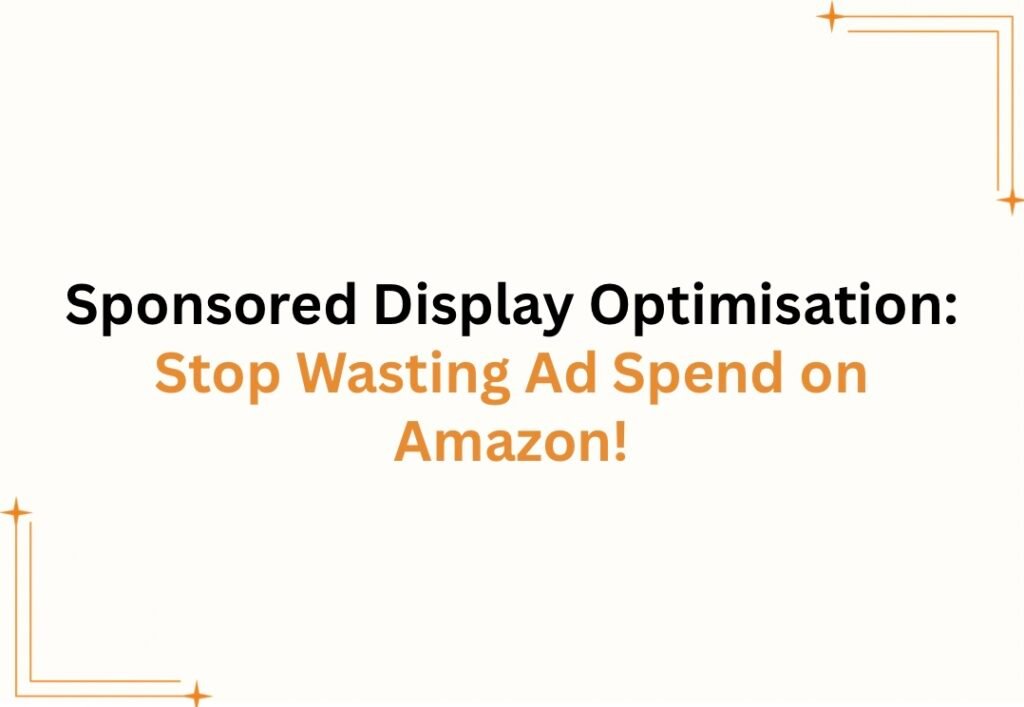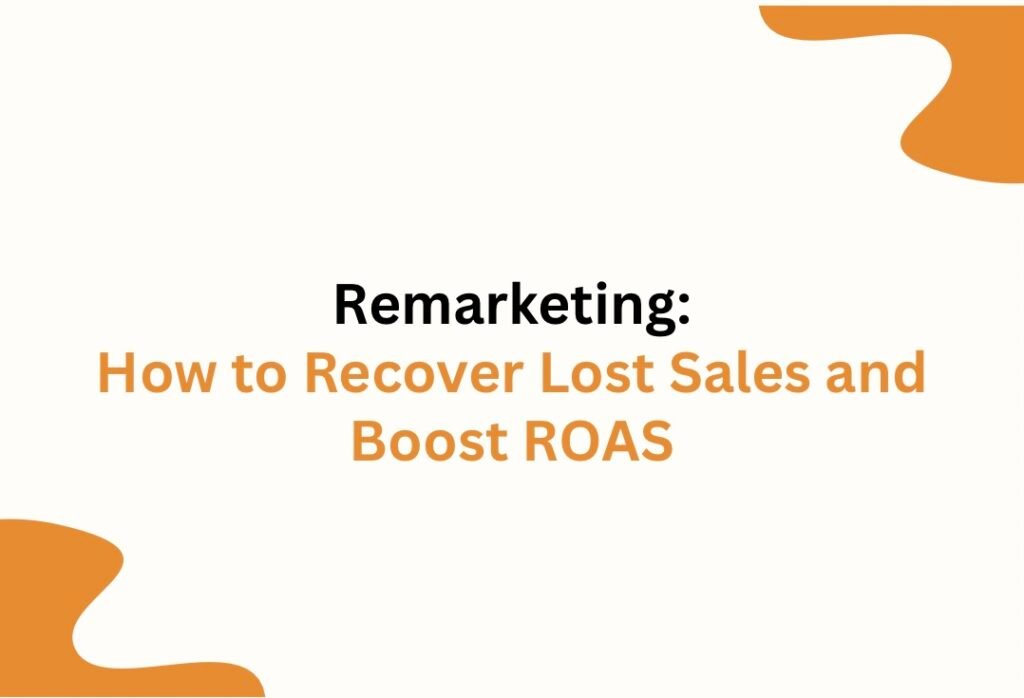Amazon In-Market Audience Targeting: Stop Ignoring Ready-to-Buy Shoppers

Amazon In-Market Audience Targeting: Reach Shoppers Ready to Convert
Amazon knows who’s ready to buy. Learn how to use In-Market Audiences to target high-intent shoppers and boost your ROAS.
Still Advertising to Cold Traffic? You’re Paying for Missed Sales
Generic targeting is expensive and outdated. If you’re still relying on keywords alone, you’re likely missing Amazon shoppers actively looking to buy right now.
These are In-Market Audiences shoppers who are comparing products, adding to cart, or even halfway through the checkout process. Skipping these shoppers? You’re not just wasting budget—you’re gifting sales to competitors.
What Are In-Market Audiences on Amazon?
In-Market Audiences are defined by Amazon as shoppers who are actively researching or considering a purchase in a specific product category.
Amazon uses real-time behavioral signals like:
- Recent product views
- Search behavior
- Purchase history
- Add-to-cart events
You can target these audiences through Sponsored Display > Audiences > In-Market Segments.
Think of them as bottom-funnel shoppers you don’t need to convince them to buy, just why they should buy from you.
📚 Source: Amazon Ads – Sponsored Display Audience Targeting
Examples of In-Market Segments You Can Target
|
Category |
Example Audience Segment |
|
Electronics |
In-Market for Headphones |
|
Home & Kitchen |
In-Market for Blenders |
|
Pet Supplies |
In-Market for Dog Food |
|
Beauty |
In-Market for Skincare |
|
Baby |
In-Market for Strollers |
These shoppers are browsing ASINs like yours, and Amazon knows it.
Why This Targeting Matters: Buyer Intent = Conversion Power
Unlike keyword targeting, which captures shoppers at all intent levels, In-Market targeting zeroes in on people:
- Comparing features
- Reading reviews
- Actively deciding what to buy not if they should buy
According to Tinuiti’s 2024 Amazon Benchmark Report, brands that used In-Market Audiences saw:
- +20% Click-Through Rate (CTR)
- +15% Increase in Attributed Sales
- Lower ACoS by 18%.
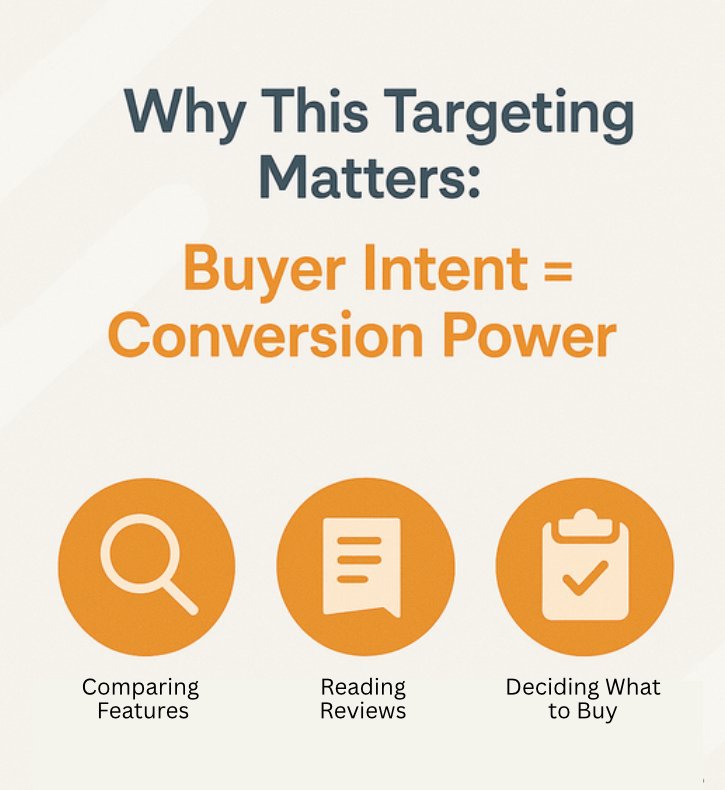
How to Launch an In-Market Audience Campaign on Amazon
Follow these steps inside your Sponsored Display campaign:
- Create New Campaign → Select “Sponsored Display”
- Choose ‘Audiences’ Targeting Type
- Select ‘In-Market’ Audiences
- Browse or search for audience segments that match your product category
- Adjust bids and set placements (Top of Search, Product Pages)
- Monitor performance by segment (CVR, CTR, ROAS) weekly
Pro Tip: Tailor your creative to match buyer intent.
Example: “Looking for the perfect headphones? See why 10,000+ music lovers chose ours.”
Real-World Results: Case Snapshot
A mid-sized CPG brand selling pet wellness products shifted 30% of its Sponsored Display budget to In-Market Pet Supplies audiences.
Within 30 Days:
- CTR jumped from 0.34% to 0.46%
- CVR increased 13%
- ACoS dropped by 22%
- Sales increased by $4,300 without additional spend
This shows that audience relevance > budget size when the targeting is aligned.
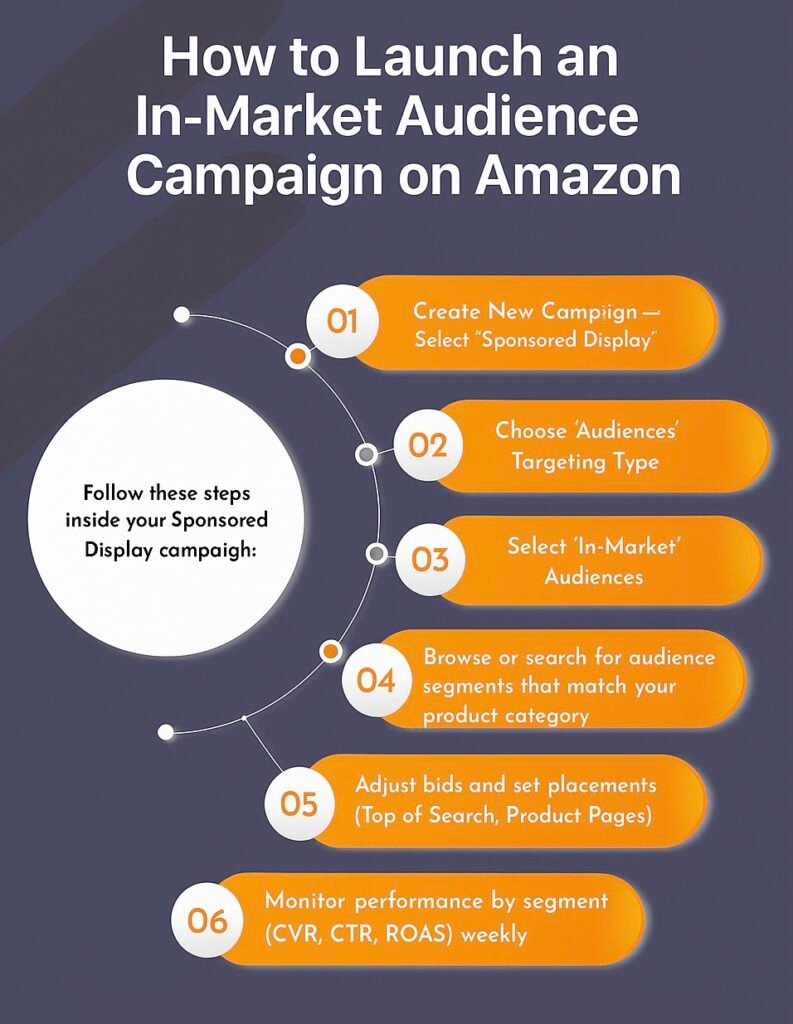
Advanced Strategy: Layer In-Market with Retargeting
For best results, use In-Market as the first touch and retarget those same audiences if they didn’t convert.
Campaign Structure:
- Stage 1: In-Market Display Campaign (reach hot traffic)
- Stage 2: Retarget non-converting viewers with optimized creatives (promo, bundle, testimonial)
- Stage 3: Use Sponsored Brands Video or Coupons to close the sale
Combining both strategies increased conversion rates by 31% in our client tests.
Common Mistakes to Avoid
Targeting irrelevant In-Market categories
Using generic messaging for high-intent audiences
Not adjusting bids based on performance
Ignoring campaign placement data
Skipping performance segmentation by audience
Best Practices:
- Start with 2–3 tightly related In-Market categories.
- Match your ad copy to the segment’s intent.
- Optimize bids based on CVR + ACoS, not just CTR.
Monitor overlap with keyword and retargeting campaigns
Here’s what you risk by skipping Lifestyle Targeting:
- Lower relevance = lost traffic
- Higher ACoS = poor ad profitability
- Competitors targeting your audience while you spray ads blindly
“Sponsored Display audiences now allow advertisers to engage shoppers based on behavioral signals such as lifestyle interests, in-market segments, and recent purchase categories.”
Source: Amazon Ads Help Documentation, 2024

Your Buyers Are Already on Amazon Are You Showing Up?
Every minute, people are actively looking for products just like yours. And Amazon knows who they are.
You can either wait and hope…
Or use In-Market Audience Targeting to meet them at the moment they’re ready to click “Buy Now.”
🎯 Want help building your Amazon audience strategy?
Book your free strategy call here
Let’s build a winning ad strategy tailored to your brand.

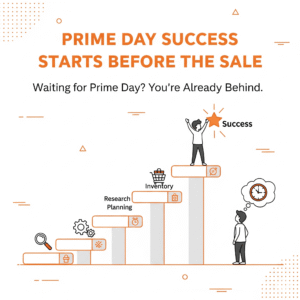
Prime Day Success Starts Before the Sale.
Prime Day Success Starts Before the Sale! Waiting for Prime Day? You’re Already Behind. The biggest wins don’t happen on
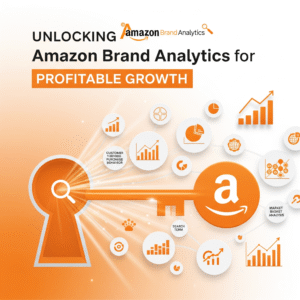
Unlocking Amazon Brand Analytics for Profitable Growth.
Unlocking Amazon Brand Analytics for Profitable Growth. Most Amazon sellers rely on basic metrics like ACOS to guide their advertising
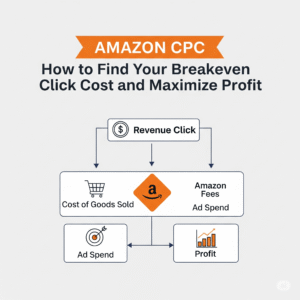
Amazon CPC: How to Find Your Breakeven Click Cost and Maximize Profit.
Amazon CPC: How to Find Your Breakeven Click Cost and Maximize Profit. When running Amazon PPC campaigns, many sellers focus
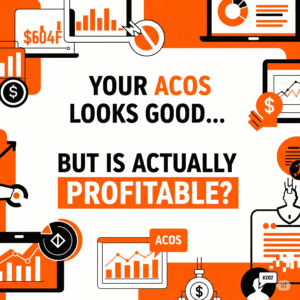
Your ACOS Looks Good… But Is It Actually Profitable?
Your ACOS Looks Good But Is It Actually Profitable? Many Amazon sellers chase a low ACOS (Advertising Cost of Sale),

Know Your Breakeven CPA Or Risk Scaling into Losses
Know Your Breakeven CPA Or Risk Scaling into Losses Many Amazon sellers obsess over CPC, CTR, and even ACOS, but
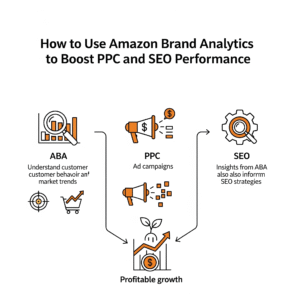
How to Use Amazon Brand Analytics to Boost PPC and SEO Performance.
How to Use Amazon Brand Analytics to Boost PPC and SEO Performance. Amazon is one of the most data-rich marketplaces


